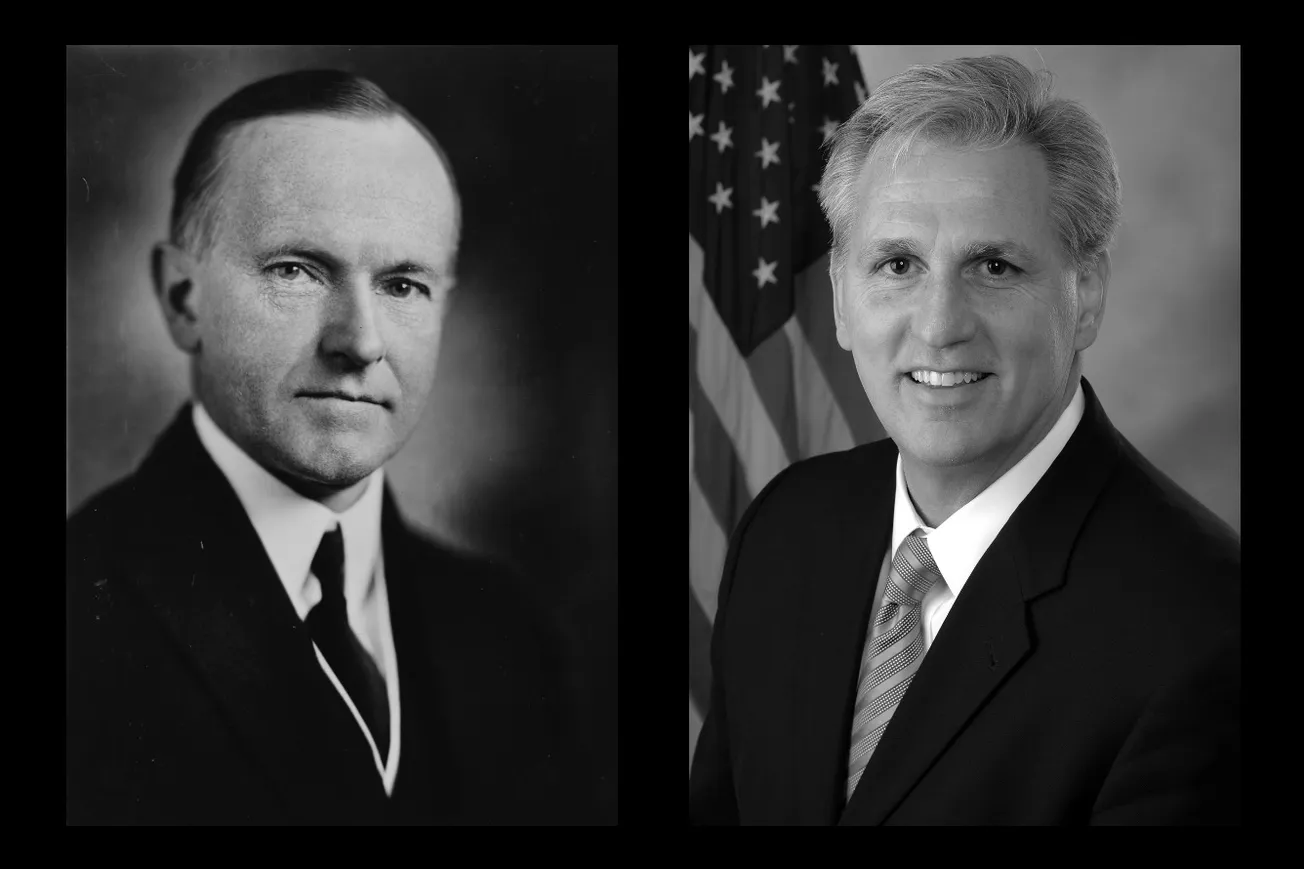Calvin Coolidge went down in history as one of the country’s worst presidents because his only-rich-guys matter economic policies helped bring on the Great Depression. But he got a shout-out Thursday when Republican Rep. J. French Hill of Arkansas joined the parade of GOP lawmakers who rose to nominate Kevin McCarthy (R-CA) for speaker.
More on that in a minute.
“The chief business of the American people is business," Coolidge said. He believed the government should stay out of business. In the end, he, and 1920s Presidents Warren G. Harding and Herbert Hoover, and GOP congresses gave Americans the business in the worst economic catastrophe in our history. (Harding and Hoover are also cellar-dwellers in presidential rankings.)
With few exceptions, a century ago, Republicans worshipped at the altar of business, the bigger the better. They were gung-ho for lavishing big tax breaks, especially on large corporations and the wealthiest citizens. The GOP was also all-in for slashing government regulations on business, which were minimal anyway. They cheered on bosses who were busting unions – which they smeared as communistic. They were cool with employers who kept worker wages low while boosting their own pay and stockholder dividends. (Sound familiar?)
In 1923, Andrew Mellon, Harding, Coolidge, and Hoover’s millionaire treasury secretary presented the Mellon Plan. It called for “what looked like a general reduction of income taxes, except that the top income brackets would have their tax rates lowered from 50 percent to 25 percent, while the lowest-income group would have theirs lowered from 4 percent to 3 percent,” Howard Zinn wrote in A People’s History of the United States.
Republican-majority Congress passed tax bills based on Mellon’s proposal.
GOP economic policy was dubbed “trickle down” economics. Proponents argued that if you cut businesses taxes and regulations, business owners would make money and share the wealth with their workers. The bosses would fatten employee paychecks and hire more workers, at higher wages to boot – thus prosperity would “trickle down” for all, it was said.
Most business owners stashed the extra cash. Or they used their GOP largesse to play the stock market and dabble in other speculative ventures, or invest in machinery to replace workers.
Easy credit kept the bubble from bursting sooner; but, simply put, by 1929 workers couldn’t afford to buy what business was producing. Hence, the economy collapsed; businesses and banks failed, and unemployment soared. (“Reaganomics” — which led to the country’s hardest times since the Depression — was warmed-over “trickle down economics.” So is what’s been dubbed “Trumponomics.”)
Coolidge was a taciturn fellow dubbed “Silent Cal.” Who could blame most Republicans for remaining silent about Coolidge – and Harding and Hoover, too? But Hill didn’t just offer up a paean to Coolidge; he likened McCarthy to him.
First, he boosted Rep. Fred Gillett, a Massachusetts Republican who was elected Speaker on the ninth ballot in 1923. This time, it took McCarthy 15, plus shameless pandering and concessions to the crazy caucus to win their support, which is sure to make him the most spineless speaker in history. “Finally, after four full days of chaos capped by intra-GOP fisticuffs and Republicans voting down their own motion to adjourn, McCarthy claimed the gavel,” Dana Milbank wrote in today’s Washington Post. “But by then his fate had become unimportant, because whoever occupies the speaker’s chair will now be irrelevant. McCarthy’s surrender has condemned the House to two years — or more — of anarchy.”
Hill said when Gillett took the gavel, "the outcome was a more robust, more unified Republican Conference, one that would go to work with President Calvin Coolidge, cut government spending, balance the budget, and cut taxes while paying down the debt.”
But wait – there’s more from Hill in the Congressional Record: “House Republicans 100 years ago unleashed a pro-growth agenda. House Republicans under Speaker KEVIN MCCARTHY will unleash a pro-growth agenda to get this economy moving. That pro-growth agenda benefited families in the 1920s. The McCarthy pro-growth agenda will benefit families across this country today. A century later, under the next Speaker KEVIN MCCARTHY, mark my words, this party will come together to unleash American energy, make the Trump tax cuts permanent, rein in runaway government spending, and fight for a balanced budget.”
History records that under the GOP’s “pro-growth agenda” in the 1920’s, jobs were plentiful. But most workers were paid so poorly that they couldn’t make ends meet. More than 60 percent of American families lived below the poverty line under the Republicans – and this was before the Great Depression.
“Prosperity,” Zinn also wrote, “was concentrated at the top. While from 1922 to 1929 real wages in manufacturing went up per capita 1.4 percent a year, the holders of common stock gained 16.4 percent a year. Six million families (42 percent of the total) made less than $1,000 a year. One-tenth of 1 percent of the families at the top received as much income as 42 percent of the families at the bottom, according to a report of the Brookings Institution.”
At the same time, America’s farm economy had been depressed since the end of World War I. Thousands of farmers had gone broke and lost their farms. Thousands more were on the edge of ruin.
In largely rural and agricultural Kentucky, the tobacco economy plummeted and "corn acreage decreased nearly one-fifth between 1920 and 1930,” wrote James C. Klotter and Craig Thompson Friend in A New History of Kentucky.
Between 1923 and 1928, the Bluegrass State ranked 47th out of 48 states in income from farming, according to the historians. “Its 1930 per capita farm earnings average of $148 stood well behind the southeast $183 mean, which trailed the national norm.”
In 1979, the 50th anniversary of the stock market crash, I interviewed 79-year-old Ray Mosby of Arlington about living through the depression. “What was it like after the crash?” I asked. “You couldn’t tell much difference,” he replied. “We were already in a depression.”
“Ain’t We Got Fun,” a popular 1921 foxtrot tune that satirized poverty in the “Roaring 20s,” echoed what Mosby said to me. The tune ends:
Landlords mad and getting madder
Ain't we got fun
Times are so bad and getting badder
Still we have fun
There's nothing surer
The rich get rich and the poor get laid off
In the meantime, In between time
Ain't we got fun
--30--
Comments








